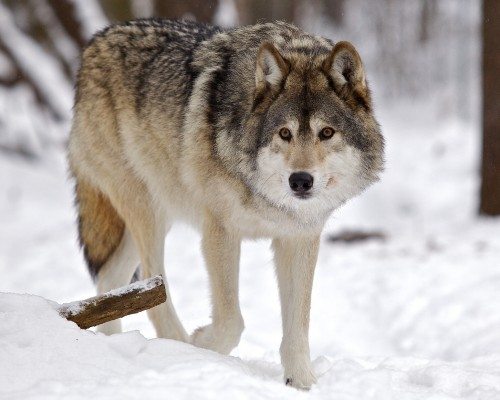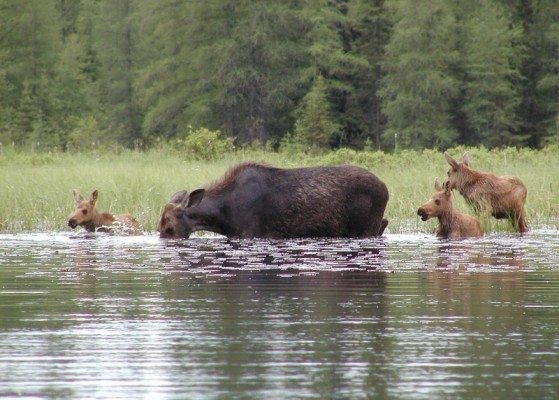Ontario Nature Blog
Receive email alerts about breaking conservation
and environmental news.
© Lora Denis
Gray wolves © Pierre Cardon
I received a call yesterday from an elderly gentleman living near Sault Ste. Marie. A life-long resident of northern Ontario and former hunter and prospector, he called to express his disapproval of Ontario’s proposal to address the decline of moose populations by killing more wolves and coyotes.
We chatted for almost an hour about many things, including his long life in the bush, his deep love of the Lake Superior region, and what amounted to his utter disdain for the government’s approach to managing moose. Like I, he believes that wildlife management should be first and foremost about managing human activity, not killing predators.

Apex predators, keystone species, strongly interactive species – these are all metaphors used by scientists to convey a sense of the profoundly important role that wolves and coyotes play in maintaining the function, composition and diversity of natural systems. Removing these animals, even locally, can lead to a cascade of problems including the rapid expansion of other species (e.g., deer), increased disease transmission (e.g., from deer to moose) and significant changes in vegetation (e,g, decline of plant species favoured by moose and deer).
And here’s what’s puzzling. The government knows that letting more hunters randomly and opportunistically shoot more wolves and coyotes is highly unlikely to benefit moose. In its background document to the proposal the government admits: “removing just a few wolves from each pack will not decrease overall predation on moose. … Only in limited circumstances may small reductions in pack size result in minor reductions in predation that benefit moose populations in localized areas.”

So the government knows that its proposal won’t do much if anything to address moose decline but wants to proceed anyway. Why? A shot in the dark approach to wildlife management? A desire to appear to be doing something? It’s a band aid solution at best.
Moose decline in Ontario is poorly understood. There are many known or suspected factors at play, from over-hunting by humans to disease and climate change. I suppose it’s relatively easy to point the finger at wolves and coyotes. Easier to kill other animals than to manage ourselves.
This proposal is sadly reminiscent of the government’s proposal to expand the spring bear hunt to address human safety concerns. Useless.

Gananoque Lake Nature Reserve © Smera Sukumar
so what is recommendation? I don’t know how anyone can blame over harvesting when there is next to no moose tags. The government won’t touch the native harvest, so what is the answer ? Coming from a family who has trapped for the past century and hunted for the same period of time, I can assure the decline in the moose population in northern Ontario has next to nothing to do with ticks, and I can assure it is not coincidence that population drop coincides with cancelation of the spring bear hunt or the creation of the wolf seal. Two of the colder winters in recent years with average or above snow levels haven’t helped the return of herds. Why not? Wolves and bears take a lot of calves and that is why MNR can’t find calves in aerial surveys. Does global warming only affect calves.? Your reading too much into what an under funded and decimated ministry can “say”because they longer have the physical or human resources to truly determine what is the problem. Coincidence that no referral to any study? That answer won’t be found by in an office. Conservation organizations will continue to fund politicians and as long as that continues, we’re going to read what they are told. I get people love wolves, but they take many a moose, and so do the bears. they do have a direct impact on moose populations, why? Because over ten years ago we decided to stop managing those two species. Funny how they (wolves or bears) never went extinct when they were controlled but now moose populations are the verge of collapse? Last spring I had the pleasure of tracking two collared moose with contracted employees of the MNR, neither collar was showing activity, Both moose were successfully harvest by wolves approximately 10 k apart. The MNR does have some information, I don’t understand why the collared moose surveys are not released. Bring back MNR employees, offer full time jobs to get the best employees as opposed to contractors who are always in doubt and eventually lost. As long as the wildlife continues to be managed from queens park, it will continue to suffer I expect within 3 years you will see the moose rebound, the politicians will say the lower tags issued did the trick, and it will help but not as much the proven management methods of bears and wolves that was thrown out the window years ago.
Hi Steve, thanks for sharing your perspective!
I love how bears are dragged into this. The fact is 85% of a black bear’s diet comes from plants. Some unguarded moose calves may be taken, but any adult moose taken would usually be sick or older ones. So the idea that the spring bear hunt ban was some sort of big factor in causing moose decline is ridiculous.
Great blogs personally I’m against the hunt . but if if moose need help to recover and science exist to prove it may need to be done .but in a controlled test plot first . the native could pull this off if we could do this and study and learn . Moose population in Algonquin park no hunting is it falling as well ? MNR ground workers great work unfortunately like every other government agencies useless the higher it goes the worse it gets its so fustraing! Send your blog to nature Canada .SumOfUs .Avaaz both international families .soften the killing part but strongly suggest getting ground troops and studies, I live in southern Ontario and I’m trying to get hunters to help study the impact on deer populations from coyotes all animals will be disected to evaluate stomach content .coincide with the birthing should show results thanks keep trying don’t give up ! We need to work together and I feel that collaboration with natives is are best chance . If you are creative look into the rural economic grants . my feelings is loss of habitat . Canada # 1 in forest distruction somthing to be proud of !
There is an awesome vdeo on youtube about the return of wolves to Yellowstone National Park. This is a must see for anyone interested in this topic and who has a say in the out come of this proposal.